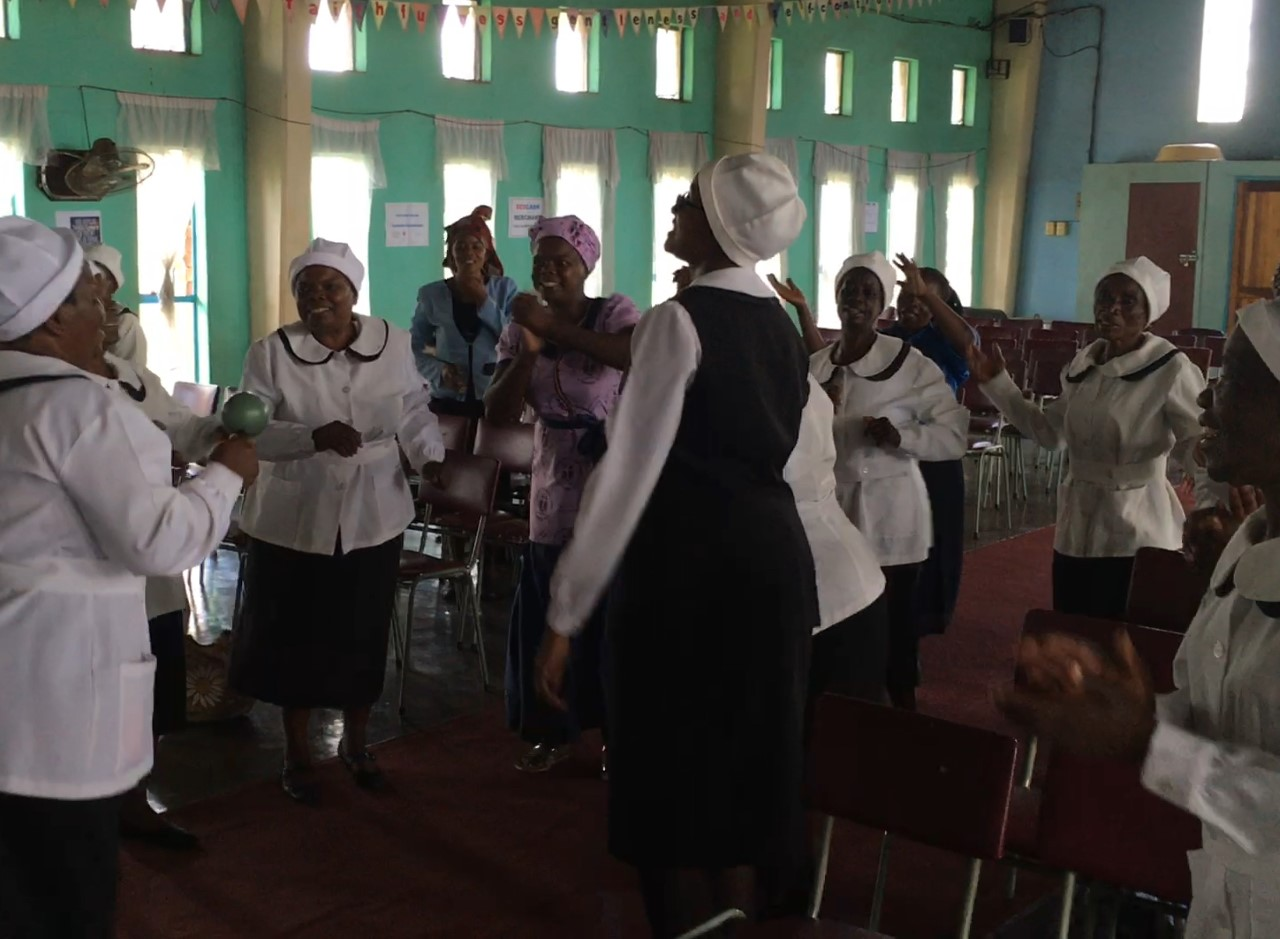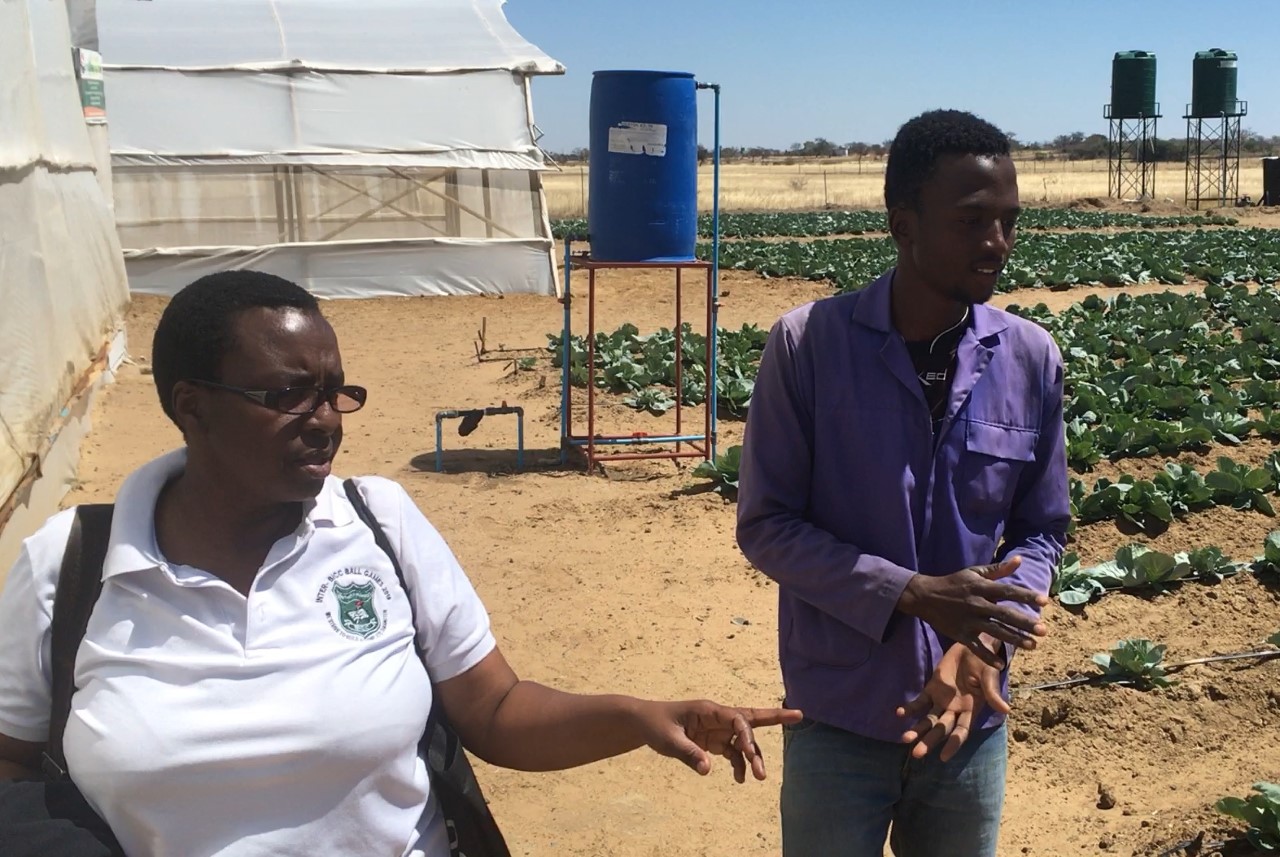A Letter from Doug Tilton, serving as regional liaison in Southern Africa
May 2020
Write to Douglas Tilton
Individuals: Give online to E200416 for Douglas Tilton’s sending and support
Congregations: Give to D507200 for Douglas Tilton’s sending and support
Churches are asked to send donations through your congregation’s normal receiving site (this is usually your presbytery).
Dear Friends –
“We used to have three meals a day,” the woman told us. “Porridge and peanut butter in the morning, tea and bread at midday, and sadza (a polenta-like white cornmeal porridge) and vegetables for supper. But now you get just three green leaves for $2. Mielie (corn) meal costs US$5 for a 10 kg bag. And school fees have quadrupled or quintupled in the last six months.”
As she spoke, the other members of the Uniting Presbyterian Church Fellowship of Women who had gathered for their weekly meeting in early February at Kuwadzana church outside Harare, Zimbabwe, nodded and murmured in agreement.
“A lot of people have stopped going to work because businesses don’t pay,” another woman said. “It costs more for bus fare to get to work than they are paid.” With unemployment widely believed to be over 90%, they claimed that some people resort to crime to try to feed their families.
As usual, vulnerable groups often shoulder the greatest burdens. “Many girls leave school at 14 or 16,” one woman said. “Often, their only option is to get married or to get into a relationship. They have kids far too early, and then bring the children to the grandparents to look after.”
All of the women had stories to tell of soaring prices, of collapsing public services, of being victimized by thieves and corrupt public servants.
They also shared stories of great faith. A small group of women responded to the deteriorating social and economic situation by committing to gather at the church at 5 am every morning to pray together. “Our theme is Psalm 121,” they told us. “Our help derives from the Lord.” (Psalm 121:2) “One of the things that gives us hope is when the Word is preached,” one woman observed. “Our hope is that God is on our side.”
When asked how change might come, one woman said: “We know that change will come from God,” and then added, sadly, “but we have come to a point that we doubt ourselves. We wonder, what have we done wrong?”
In expressing appreciation to the women, who had been gracious enough to share their painful stories with two strangers—PC(USA) Africa Area Coordinator Rev. Debbie Braaksma and me—I tried to assure them that they did not “deserve” to suffer; that God loves them and will continue to walk with them and equip them to struggle for a more just world.Zimbabwe is a beautiful country, rich in natural resources and blessed with a gracious and friendly population. So, it is all the more heart-breaking to witness the travails which its people have had to endure. These women—like most Zimbabweans—are survivors of the poor governance and poor stewardship exercised by elites in Zimbabwe and around the world who care more for their own pockets than for the well-being of God’s people.
Much of February’s economic crisis hinged on the government’s announcement at the end of June 2019 that it would no longer allow foreign currencies to be used for domestic transactions. This decree effectively ended the decade-long period of “dollarization” during which people used foreign currencies—particularly U.S. dollars—instead of the Zimbabwe dollar, which had been ravaged by hyperinflation. (The last Zimbabwe dollar note to be printed had a face value of Z$100 trillion … but a buying power of less than U.S. $5.)
All commerce would again be transacted in local currency—either the Zimbabwe “bond note,” a physical currency, or a virtual currency with the unwieldy name “Real Time Gross Settlement dollar” (RTGS). The two were equivalent when introduced, and both were intended to have the same value as a U.S. dollar. Most bank accounts were held in RTGS, not in U.S. dollars, so if you deposited US$100, you then had 100 RTGS.
Despite the official parity between the currencies, physical bond notes were in greater demand than virtual RTGS, and U.S. dollars were coveted most of all. Merchants soon found ways around laws prohibiting them from pricing goods differentially, depending on the currency proffered. And once foreign currencies were banned, the gap between the value of a U.S. dollar and the Zimbabwean alternatives widened even faster, making basic commodities even more unaffordable. By the end of 2019, the United Nations’ Special Rapporteur on the right to food found that more than sixty percent of Zimbabwe’s population was food insecure with a staggering ninety percent of children aged six months to two years not consuming “the minimum acceptable diet”.
The coronavirus pandemic has brought new challenges, even though Zimbabwe still has very few confirmed Covid-19 cases (perhaps due to limited testing). On March 30, when the country began a five-week national lockdown to slow the spread of the virus, there were only seven recorded cases; a month later there were still fewer than 40. The disruption of markets and supply chains caused by the lockdown, coupled with suppliers’ demands for “hard” currency eventually prompted a change of monetary policy. In April, the government reauthorized the use of U.S. dollars—at least until the end of 2022. It also re-established a fixed exchange rate between Zimbabwean currencies and the U.S. dollar … but at 25 to 1. So, savings that were worth $100 last year are now worth $4—or even less if, like most people, you are only able to buy dollars on informal, parallel markets.
As a result, offerings have fallen drastically, and churches are struggling to support pastors and ministries. So, it is heartening to see the great strides toward self-sufficiency that the Uniting Presbyterian Church in Southern Africa Presbytery of Zimbabwe is making with its farm at Vimridge, outside the southwestern city of Bulawayo. The Presbytery has erected three large greenhouses in which they are growing cucumbers, peppers, and tomatoes for local supermarkets. The income has allowed them to expand the project and to experiment with new crops, including biofuels. They have been able to keep the farm running throughout the COVID-19 lockdown and have been able to use the produce to help alleviate food insecurity in the region.
As ever, I remain grateful for the inspiring ministries of our partners in Southern Africa, for the dedication of my Presbyterian Mission and mission co-worker colleagues, and, particularly, for the encouragement that your partnership provides. As we together navigate a challenging season of uncertainty, please continue to pray for our partners and know that they, too, are praying for you.
Grace and Peace,
![]()
Doug Tilton
![]() You may freely reuse and distribute this article in its entirety for non-commercial purposes in any medium. Please include author attribution, photography credits, and a link to the original article. This work is licensed under a Creative Commons Attribution-NonCommercial-NoDeratives 4.0 International License.
You may freely reuse and distribute this article in its entirety for non-commercial purposes in any medium. Please include author attribution, photography credits, and a link to the original article. This work is licensed under a Creative Commons Attribution-NonCommercial-NoDeratives 4.0 International License.

